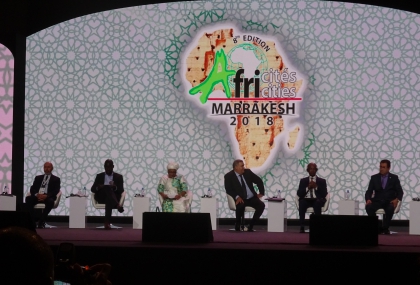
In late November, the 8th edition of the Africities summit took place. 8300 participants gathered in Marrakech, Morocco, to discuss ‘The Transition to Sustainable Cities and Territories, The Role of Local and Sub-National Governments of Africa’.
Within the framework of Africities, the Secretariat of the Development Partners Network on Decentralisation and Local Governance (DeLoG), together with United Cities and Local Governments, organised a session on the topic ‘Leave No One Behind – by localising the 2030 Agenda’. This session gave room for an exchange on the experiences, opportunities and challenges when localising the 2030 Agenda. The main focus was to raise awareness for the principle ‘Leave No One Behind (LNOB)’.
Dr. Moizza Binat Sarwar, Senior Research Officer ODI, framed the challenges with her presentation on ‘Leaving No One Behind in Cities’. Panelists and other participants quickly entered into a debate on how local authorities should respond to the 2030 Agenda and its call not to leave the poorest and most vulnerable people behind. This included, for example, access to basic services, inclusion and social cohesion, as these are important factors of sustainable cities and regions. Mr. Isaac Tettey, Regional Economic Planning Officer of the Volta region in Ghana, pointed out that special efforts have to be made in the education sector. In addition, emphasis should be placed on raising awareness of the 2030 Agenda in the communities: ‘We have a lot of material of the SDGs in our office.’ He described how in his region in Ghana, localising the SDGs began by aligning these goals with the local development plans and then making sure to involve everyone in participation processes to leave no one behind.
The Swiss Agency for Development and Cooperation, co-financier of the DeLoG Secretariat, was represented by Serge Camille Mensah Tonoukouin from Benin. He stressed the importance of monitoring, coordination and evaluation when implementing the 2030 Agenda at the local level and emphasised that ‘(…) elected officials need to give those who are left behind a chance’. This can only be done on the basis of reliable and specific data. Data of such quality show inequalities and help to access those in danger of being left behind. Paul-Henri Nguema Meye of AFRISTAT pointed out the specific challenges in statistics.
Christopher Kang’ombe, Mayor of Kitwe and President of the Local Government Association of Zambia, concluded that ‘it is our task to exchange experiences on the strategies in implementing the 2030 Agenda at the local level and to learn from each other’. Participants agreed that the 2030 Agenda can only be implemented if the LNOB principle is at the forefront of all development efforts. Development plans, implementation strategies and policy frameworks need to reflect this priority. Inclusion should not be a tick-box agenda. Instead, the principle to leave no one behind has to be applied to all targets when localising the SDGs.
The message from the DeLoG session resonated strongly with the whole conference agenda and is prominently placed in the final declaration of the development partners: “(…) We commit ourselves to support such partnerships to fulfil our global commitment to a sustainable future guided by the principle of ‘Leave No One Behind’.”
Source: DeLoG
